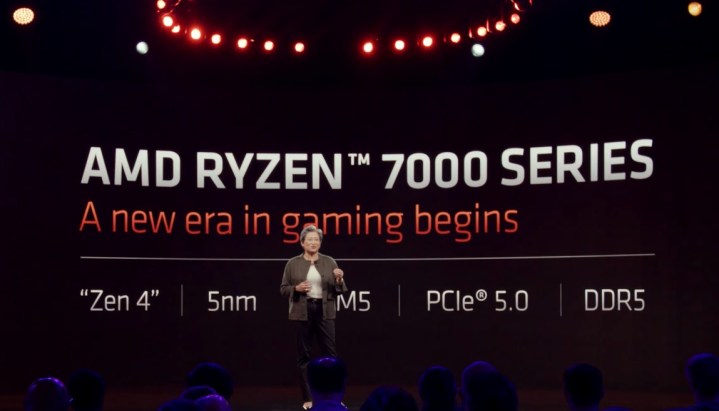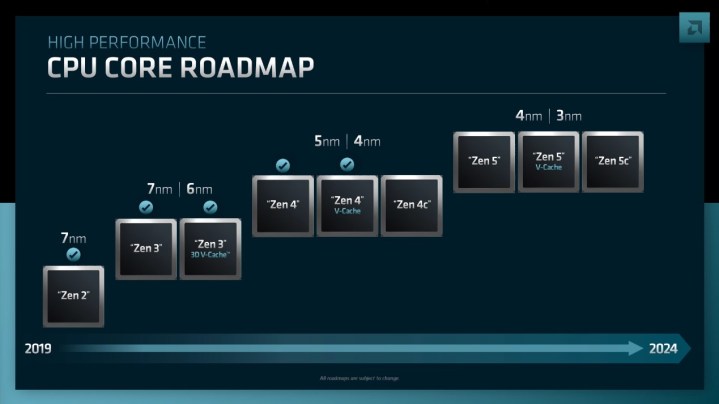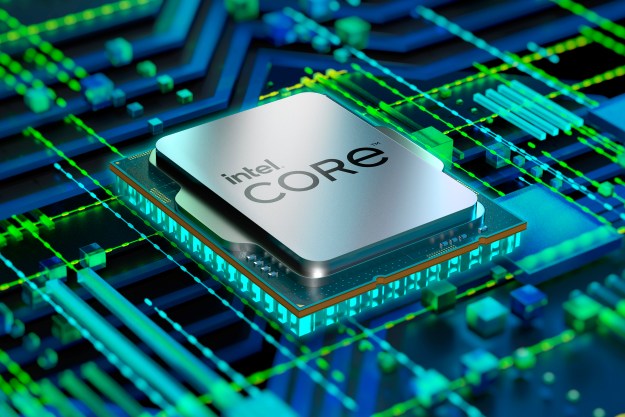Looking for a CPU upgrade for your gaming machine? We’ve got some good news: AMD’s Ryzen 7000 Zen 4 CPUs are set to deliver significant boosts in performance compared to the previous generation and long-awaited support upgrades for the latest connections.
The Ryzen 7 7700X chip, in particular, looks like an excellent combination between a performance upgrade and affordability. But that also sets it against the similarly priced Intel Core i7 12700K — a chip from the 12th-generation Alder Lake series Intel released in late 2021. Just how do these processors stack up, especially for gamers? Let’s take a look at what we know.
Specs

| Ryzen 7 7700X | Intel Core i7-12700K | |
| Architecture | Zen 4 | Alder Lake |
| Process | 5nm | 10nm |
| Cores/threads | 8/16 | 12 (8P + 4E)/16 |
| Base frequency | 4.5GHz | 3.60GHz |
| Boost frequency | 5.4GHz | 5.00GHz |
| L3 cache | 32MB | 25MB |
| Base power/TDP | 105W | 105W |
| Max boost power/TDP | 170W (approx) | 190W |
We’ll discuss more about these differences further down. Keep in mind, these are AMD’s own numbers — we are still waiting on independent benchmarks, including our own tests, to verify that everything is accurate here. AMD’s statements should be confirmed by real-world numbers before we can absolutely guarantee these specs.
Also note that while the Intel chip has 12 cores, only eight of these are Performance cores, while the rest are Efficient cores. This was a change that Intel adopted for its 12th-gen chips: Performance cores are larger, faster, and optimized for single-thread performance. Efficient cores are smaller, optimized for multi-core performance, and designed to excel at background tasks. This hybrid approach is one reason that the Intel Core i7-12700K chip could offer credible competition for the Ryzen 7 7700X, especially when in heavily multi-threaded scenarios, despite being the older design.
That said, the Zen 4 architecture is newer, and the 7700X does run at higher clock speeds and has more L3 cache, so we’ll have to see what these chips can do in real-world testing before making any hard calls on performance.
Pricing and release date
The Intel Core i7-12700K released alongside the rest of the Alder Lake CPUs in the fall of 2021. Its recommended retail price is $410, but it typically sells for around $380 at the time of writing.
AMD’s Ryzen 7 7700X will be priced at $399 when it arrives on September 27. The question remains, however, whether this pricing will hold firm once Intel launches its Raptor Lake 13th-generation CPUs later this year. Considering the Ryzen 7000 is designed to compete with that as much as Alder Lake, AMD may price its chips more aggressively once details about Intel’s next-gen line are revealed.

Performance
The Ryzen 7 7700X with its new Zen 4 architecture includes eight cores and 16 threads, while the Intel Core i7 12700K offers 12 cores, supporting a total of 20 threads. That’s a big difference right off the bat, and it may seem like the Intel option has a clear upper hand when it comes to performance. However, additional physical cores aren’t the only important consideration.
The 7700X is built on the advanced TSMC 5nm process node, helping to make it a smaller, denser CPU design, about 50% of the size of the Intel Core i7-12700K’s 10nm Intel 7 manufacturing approach. The architecture is an improvement over previous-generation Zen 3 designs, making it more efficient and able to run at higher clock speeds. That should give the Zen 4 CPU a leg up in real-world performance over the older, lower-clocked Alder Lake design, despite the core count disparity.
Unfortunately, there aren’t any third-party benchmarks for any Ryzen 7000 CPUs so far, but there have been some leaked benchmarks. Those results suggest that on a single-threaded front, the 7700X is roughly equivalent to the 12700K, but that when it comes to multi-threaded performance, it’s notably quicker, offering the kind of performance only previously seen with the Core i9-12900K.
That’s only one benchmark, though, and we’ll need to see more before drawing any firm conclusions, particularly gaming benchmarks.

Processor graphics
Both the AMD Ryzen 7700X and the Intel Core i7-12700K have integrated graphics. That’s a big change from AMD’s typical CPU designs, which don’t offer onboard GPUs outside of its limited-run APU designs, like the 5600G and 5700G. The 7700X will have onboard graphics, but it won’t be as capable as AMD’s typical APUs. It’s even been said that it’s not designed for gaming, although it will likely be capable of something — the question is, what?
The Intel Core i7 12700K comes with its own Intel UHD Graphics 770 with a base frequency of 300MHz. It’s more than enough for esports and indie gaming, so it will be interesting to see if the AMD GPU can compete.
Holding pattern
The Ryzen 7700X is likely to be the fastest CPU in this head-to-head, but until we actually get our hands on it, we can’t know for sure. For now, on paper, it’s the better CPU, with greater feature support and more impressive specifications. The 12700K isn’t dead in the water, though. It’s still a very powerful CPU for gaming and productivity work, and with price cuts ahead of the 13th-generation launch later this year, it could remain competitive for some time to come.
Editors' Recommendations
- Nice try, Intel, but AMD 3D V-Cache chips still win
- I tested Intel’s Core i5-14600K against its cheaper sibling. Don’t waste your money
- Intel Core i5 vs. i7: Which CPU is right for you in 2023?
- Intel’s Core i9-13900KS hits 6GHz out of the box, but there’s a catch
- Intel Core i9-13900K vs. Core i9-12900K: Is it worth the upgrade?




